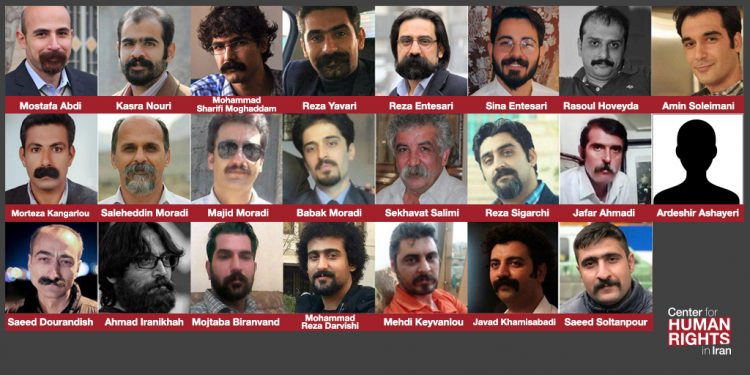Imprisoned Sufi Dervishes Launch Hunger Strike Demanding Freedom of Movement for Ailing Spiritual Leader
 More than 70 imprisoned members of the Sufi Gonabadi Order began a hunger strike in early November to honor their ailing spiritual leader Nour-Ali Tabandeh, who had been hospitalized due to complications from his own hunger strike, the Center for Human Rights in Iran (CHRI) has learned.
More than 70 imprisoned members of the Sufi Gonabadi Order began a hunger strike in early November to honor their ailing spiritual leader Nour-Ali Tabandeh, who had been hospitalized due to complications from his own hunger strike, the Center for Human Rights in Iran (CHRI) has learned.
Sixty-nine of the hunger strikers are in the Greater Tehran Central Penitentiary (GTCP) in the city of Fashafouyeh, and three others are in Tehran’s Evin Prison.
More than 150 dervishes who are not detained also joined the hunger strike to protest security officials’ restrictions on Tabandeh’s movements and visits, the Gonabadi channel on the Telegram messaging app reported on November 5.
The channel also posted images showing Tabandeh looking frail on a wheelchair and “being taken to the operating room” in Tehran’s Mehr Hospital following laboratory tests.
“When news reached the prisoners that Dr. Tabandeh is refusing to eat, the dervishes went on a hunger strike on Sunday, November 3,” Faeze Abdipour, a Gonabadi activist, told CHRI.
“The hunger strikers want all the restrictions on Dr. Tabandeh to be removed and the dervishes to be allowed to hold ceremonies in their religious centers,” she added. “They are also demanding that the state stop treating the Gonabadis, particularly Dr. Tabandeh, as a security threat.”
The Islamic Republic’s ruling Shia establishment views any alternative belief system, including those seeking converts such as the Christian and Baha’i faiths, as a threat to Shia dominance in the country. Iranian authorities have imprisoned dervishes as well as expelled them from university for peacefully practicing their faith.
Hundreds of dervishes were detained and dozens hospitalized on February 19, 2018, at a street protest in Tehran after police opened fire at the demonstration, according to the Majzooban website.
The dervishes were protesting in front of the 102nd Police Station for the release of Nematollah Riahi, a fellow devotee who had been arrested outside of Tabandeh’s Tehran-based home.
“We are ever more concerned and worried about Dr. Tabandeh’s health following reports about his weakness resulting from not eating enough food,” the imprisoned hunger strikers said in a statement published on November 4. “We humbly beg his holiness… to stop avoiding food. Until then we will not eat or take any medications.”
The hunger strikers are demanding freedom of movement for their 92-year-old leader and the reopening of Gonabadi religious centers, which have been shut down since February 2018 following a deadly clash between police and security forces in Tehran that led to the death of one dervish and three policemen, in addition to hundreds of arrests.
In late August 2019, security officials gave Tabandeh permission to move to Bidokht, his hometown in Khorasan Razavi Province. It’s unclear whether he was allowed or able to go there.
On October 15, he was hospitalized in Tehran because of undisclosed medical issues. He stopped eating food on October 30 to protest ongoing security restrictions.
“Mr. Tabandeh stopped eating because the authorities are not allowing the dervishes to visit him,” Abdipour told CHRI. “He is also concerned about the condition of the imprisoned dervishes who continue to suffer because of lengthy unjust sentences.”
Read this article in Persian.






